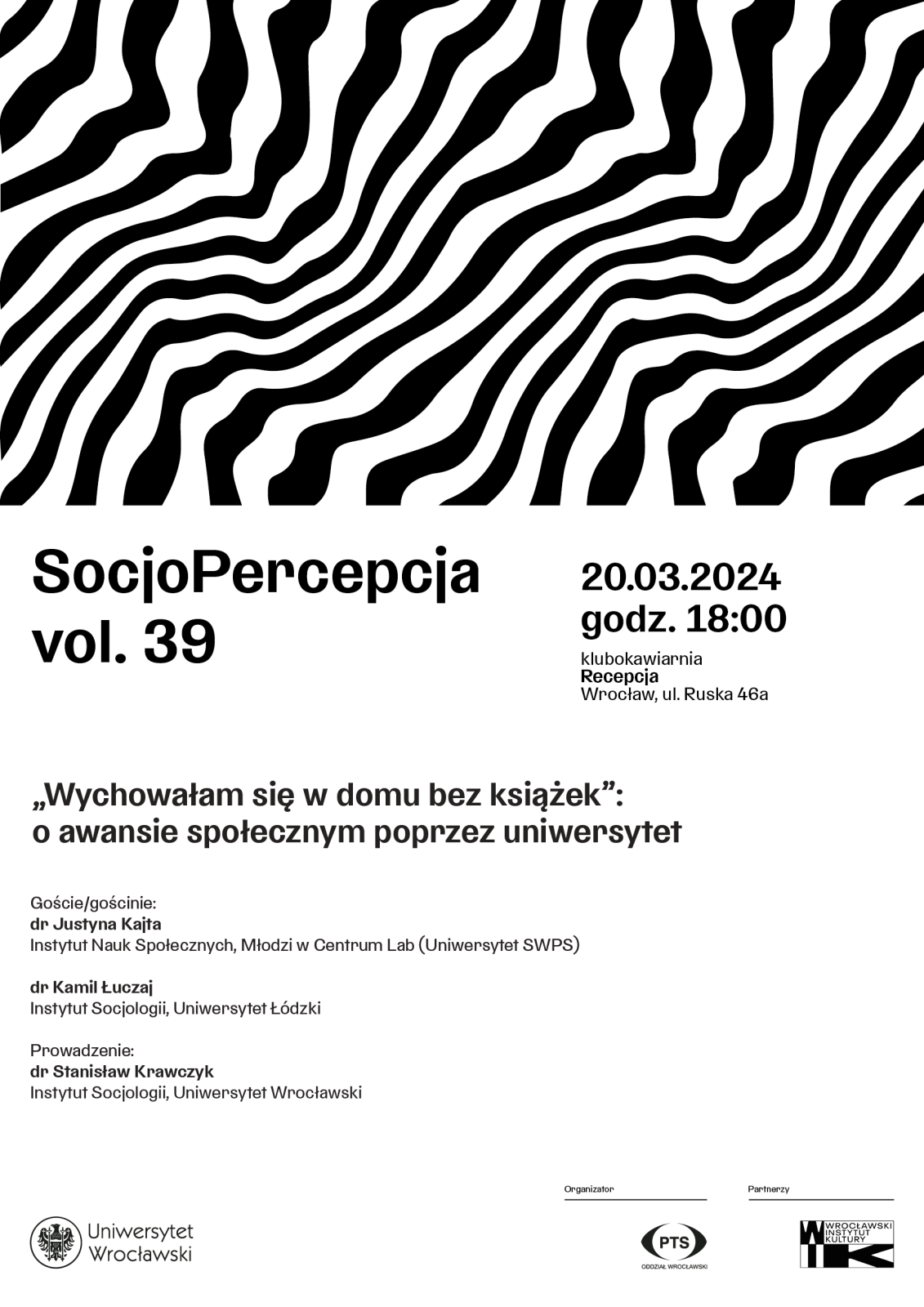The Wrocław Branch of the Polish Sociological Association, and the Institute of Sociology of the University of Wrocław, in cooperation with the Wrocław Institute of Culture, invite you to the next meeting within the series SocioPerception vol. 39 “I grew up in the home without books”: on social advancement at university.
The meeting will take place on 20th March (Wednesday) at 6:00 PM in the café-club Recepcja at ul. Ruska 46 in Wrocław
Our guests will be:
Kamil Łuczaj (University of Łódź) – author of the book “The Biographical Experience of Entering the Academic Profession Popular-Class Lecturers at the Post-Socialist University.” Researcher of higher education and migration. He specializes in qualitative methods (including narrative interviews, in-depth interviews, and participant observations). Graduate of the Jagiellonian University and AGH University of Kraków. Assistant professor at the Department of the Sociology of Culture at the University of Łódź. Since 2019 member of the Committee for Migration Research at the Polish Academy of Sciences.
Justyna Kajta (SWPS University) – sociologist, member of the Youth Research Center (SWPS University), researcher of the project “ULTRAGEN. Becoming an adult in times of ultra-uncertainty: intergenerational theory of ‘shaky’ transitions,” and project leader of the “RaM-CLASS” – Reproduction and class mobility – biographical experience in the academia, art, and business field. Her interests are social classes, biographical research, experiences of the transition to adulthood, and political commitment.
Stanisław Krawczyk (University of Wrocław) – moderator of the discussion, researcher of game studies and higher education studies. His research methods are in-depth interviews, content analysis, and discourse analysis. He is a co-author and author concerning the criteria of identifying top researchers in academia (together with Szadkowski, K. and Kulczycki, E. “Discourse: Studies in the Cultural Politics of Education”), the ways of perception of English in social sciences and humanities (“Globalisation, Societies and Education.”), and a conversation on abuse of power in academia (with A. Swatek “Higher Education”).
How does social advancement proceed in the academic community? How do individuals from statistically disadvantaged backgrounds, such as poverty, become academics? How do they feel during the process? In Poland and other post-socialist countries, there is little research on this topic. Today, as we increasingly discuss social inequality and the folk history of Poland, it is high time to examine similar issues in academia itself.
The starting point of our debate will be the book “The Biographical Experience of Entering the Academic Profession: Popular-Class Lecturers at the Post-Socialist University” (University of Łódź Publishing House, 2023). It is a result of several years of work of the team led by Kamil Łuczaj, focusing on the biographies of the socially ascending university lecturers, who “managed to escape the collective destiny of their social class,” paraphrasing the famous sociologist – Pierre Bourdieu. Besides the biographical interviews with the individuals, who experienced the social advancement, the research includes the interviews with their relatives, friends, and colleagues.
The studies have shown that the academic career of individuals, who did not come from intellectual families, faced numerous difficulties. These included negative emotions associated with a sense of loss of family bonds (e.g. respondents would speak differently, correct the mistakes of their parents), shame associated with the financial situation (wearing clothes sewn at home, eating products only from one’s own field), or imposter syndrome (a conviction that one is not worthy of success due to lack of self-confidence).
Meanwhile, studies have shown perception different from the one created by Bourdieu, while describing higher education in France in the second half of the 20th century, characterized by rigid divisions. A reference to the mechanism of simple reproduction (according to which “carpenters’ children become carpenters”) is not sufficient to describe the results of the interviews. It is needed to consider the character of post-socialist context, the consequences of political transformation, and the widespread availability of higher education in the 1990s. The latter made the advancement easier, yet socially ascending individuals still suffer from such consequences as degree devaluation or the decline of academic prestige. Additionally, upward social mobility entails additional emotional costs, though perhaps to a lesser extent than suggested by Bourdieu (due to the conviction of social mobility in Poland, fueled by the ideological message of the Polish People’s Republic).
Translated by Sylwia Szypszak (student of English Studies at the University of Wrocław) as part of the translation practice.





